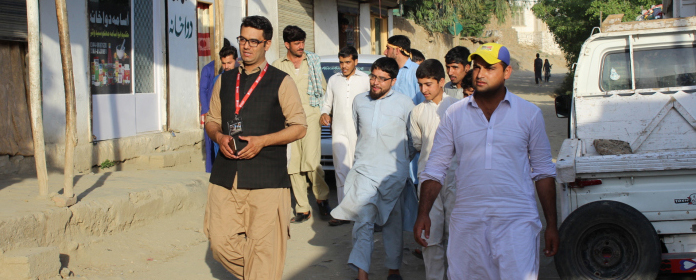Afghan refugees are portrayed in a very negative light in Pakistani media, according to an ICS thesis
Saqlain Hassan assures that this group is reluctant to repatriation because they do not believe that their home country is "a suitable place to successfully start a new life".

PHOTO: Courtesy
"Pakistani media present a very negative image of Afghan refugees." This is the main conclusion of Saqlain Hassan's thesis , carried out on the project 'Public discourse' of the Institute for Culture and Society (ICS) and framed in the doctoral program of the School of Philosophy and Letters of the University of Navarra.
The goal of this corpus-assisted study has been to analyze the language used by the press and the public to represent this group.
From agreement with the research, both blame him for "the country's current bad status in terms of higher crime rates in the areas where they predominate, terrorism, worsening public order, labor market congestion, introduction of drugs, overpopulation and promotion of the 'Kalashnikov culture' -resolving political disputes through weapons-".
These reasons, he argues, lead to widespread rejection of Imran Khan's proposal to give them the permanent residency program .
Regarding the questionnaires conducted with people from the local population, the analysis of speech has revealed a "high negativity" towards the refugees. "Most respondents identified them as Namak Haram - an expression in the Urdu language meaning 'traitors' -, selfish, opportunistic and disloyal," it stresses.
Another of their findings is that the Pakistani public does not want Afghan refugees to have the same opportunities as work "because they believe that because of them the labor market has become saturated."
However, there is a difference with the surveys conducted with Pashtuns - who share the culture and language of the Afghans: they showed elements of ethnic nationalism and cultural and religious solidarity, an influence core topic on the behavior of some people.
Depersonalization through counterpositionsIn the articles consulted, Hassan detected that the press depersonalized Afghan refugees by differentiating them as foreigners, through counterpositions such as 'us and them' or 'Afghans and Pakistanis'.
On the opinion about the image they disseminate in news coverage, Pakistani citizens are divided, according to Hassan: "Some believe it is true because Afghans are involved in crimes, while others think the media is mainly controlled by the state and the elites and makes journalists propagate this negative portrayal."
In addition, Saqlain Hassan interviewed Afghan refugees to get their views on their stay in Pakistan, the repatriation process and status of the camps. As he explains, "they face numerous problems such as lack of teachers, doctors, medicines and emergency services in their hospitals, lack of job prospects for graduates and lack of clean drinking water".
Despite these harsh conditions, he says that when asked which citizenship they prefer, they opt for Pakistani citizenship. "They are reluctant at the idea of repatriation because they don't think Afghanistan is a suitable place to successfully start a new life."
Description of the burqaIn the last chapter of his thesis he has analyzed a corpus of Public discourse and journalistic to analyze how the burqa is described by the Pakistani and British press as well as by women (Pakistani citizens and users of this garment).
"The media is extremely negative towards the Afghan-influenced (blue-colored)burqa . They call it a small private tent, invisibility cloth, financial aid for suicide bombers, terrorists' garment, garment against women's freedom...," he notes.
The vision of Pakistani Pashtun women is different: "Some wear it because they believe it is something cultural and everyone around them wears it, others believe it is a religious garment because it covers the body and makes it safe, others wear it to make their husbands happy, and others because it is a family tradition. However, she points out that some do not want to wear this heavy burqa because it is difficult for them to walk and breathe "and that is why they refer to it as a 'cage' or a 'real hell'".
ICS blog post: Is the media's portrayal of refugees accurate? A work on the ground in Pakistan




